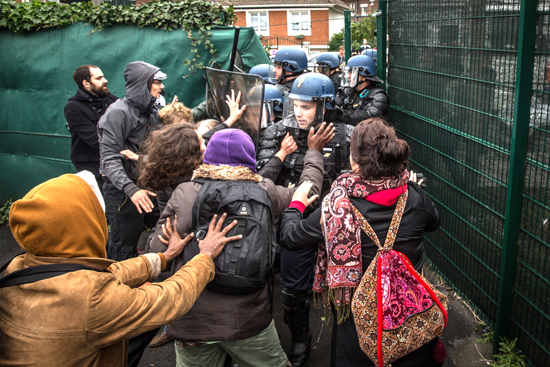
‘In the last weeks many of us had to face a lot of police violence. Some of us got broken hands and broken legs… In the next days the fascists will come to Calais to meet and demonstrate here. There is no shelter for us to hide from them. We cannot trust the police to protect us as we experienced already so much violence from them. Migration is not a crime and each of us has reasons why we had to leave our countries and our families and why we are here now. Europe is always talking about human rights and freedom but we can not find this here.’ (Statement from migrants’ demonstration, 5 September 2014)
The plight of the migrants stranded in Calais hit headlines in Britain at the beginning of September when nearly one hundred managed to scale the fence surrounding the French port and storm the ramp of a ferry bound for Dover. The crew drove them back with fire hoses and hurriedly sealed the ship.
As the number of migrants arriving in Calais rose over the summer, the city’s right-wing mayor Natacha Bouchart threatened to close the port to British ferries if the UK did not do more to deter migrants. Britain’s response has been to pledge £12m towards improving security in Calais, and to offer France the nine-foot high steel barricades used during the NATO summit in Wales.
As we reported in FRFI 240, Calais attracts thousands of migrants who have fled poverty and war in Africa and the Middle East, hoping to cross the Channel to Britain. Those who manage to make the dangerous, transcontinental journey to the French coast, often over months or years, face an insecure and precarious life in makeshift shelters on the streets of the city, the victims of constant police harassment and brutality and reliant on volunteers for subsistence. In their desperation to reach Britain, many risk their lives clinging to the axles of lorries, or flattening themselves into cabin storage spaces. Deborah Edwards is one of many campaigners who has travelled to Calais to support the migrants, and sent this eyewitness report.
‘In Calais we distributed some stuff to Eritreans, Sudanese and Syrians and a couple of young Afghan boys. It was unbelievable. I’ve never seen so many, mostly men, ducking and diving in a desperate fight to slip on or under a vehicle big enough to take them. The motorway signs were just a mass of silhouettes, heads of men reflected in the night lights; others were hiding amongst the hedges and some were just sat waiting to storm the oncoming traffic; some attempted to divert the police whilst one broke away in a life threatening gamble. The High Security Police (CRS) are now lining the road to the port in full riot gear and armed, for about two miles. Many of the migrants have even swum out to a ferry and tried to cling on to its sides – and of course when they get caught, if they don’t die before, the boat goes straight back and puts them back to square one in the hands of repressive and racist police and border officials. Tragic.
[Already when I visited the camps in February] conditions were difficult. One major problem is police harassment and brutality, supported by local young ‘fascist’ groups carrying out verbal and physical attacks routinely. Yet, having no documentation and no way forward, the migrants have said they prefer to die here in Calais in the squalor and inhuman conditions, where they battle to survive, than to return to their native countries. Such statements sum up the desperation of the migrants in Calais – but also their resilience. They are unrelenting in their struggle; as far as they are concerned they have little to lose.
It’s hard to imagine we live in the 21st century when you witness the tragedy unfolding in places like Calais, men huddled in door ways, killing time, waiting for the energy or chance to attempt the perilous ordeal of getting across the Channel. In the town centre, men roam around looking shell-shocked and disoriented, the constant threat of being detained or deported weighing down on them.
The frontier between Calais and Dover is the most fortified since the Middle Ages and you can see and feel it.
Supporters from solidarity organisations such as No Borders and Migrant Solidarity bear witness to the atrocious conditions and do what they can to mitigate them. On my trip, the clothes we brought were distributed amongst tyoung women, mostly from Eritrea, who were seeking sanctuary in a squat which has since writing been raided and closed down; money was donated to contribute to the food that is cooked by volunteers and distributed once a day – often the only food the migrants will get all day
There was no shortage of people in need as we drove to a storage garage huddled away on a little housing estate. We passed several small smoky encampments and what can only described as mini slums along the river, under bridges and on any bit of wasteland available, in full view of passers by.
We dropped off emergency blankets, waterproofs, shoes, clothes and tents. Nine men appeared out of a tiny garage and came rushing over to find shoes and pants, one guy was barefoot wearing a threadbare pair of long johns. They were living and hiding in that tiny space, no window, no light, nothing, with the constant threat of being raided by the police or local fascists if discovered. ‘
To support the Calais migrants or make donations of material goods, see: calaismigrantsolidarity.wordpress.com or noborders.org.uk.org.uk




